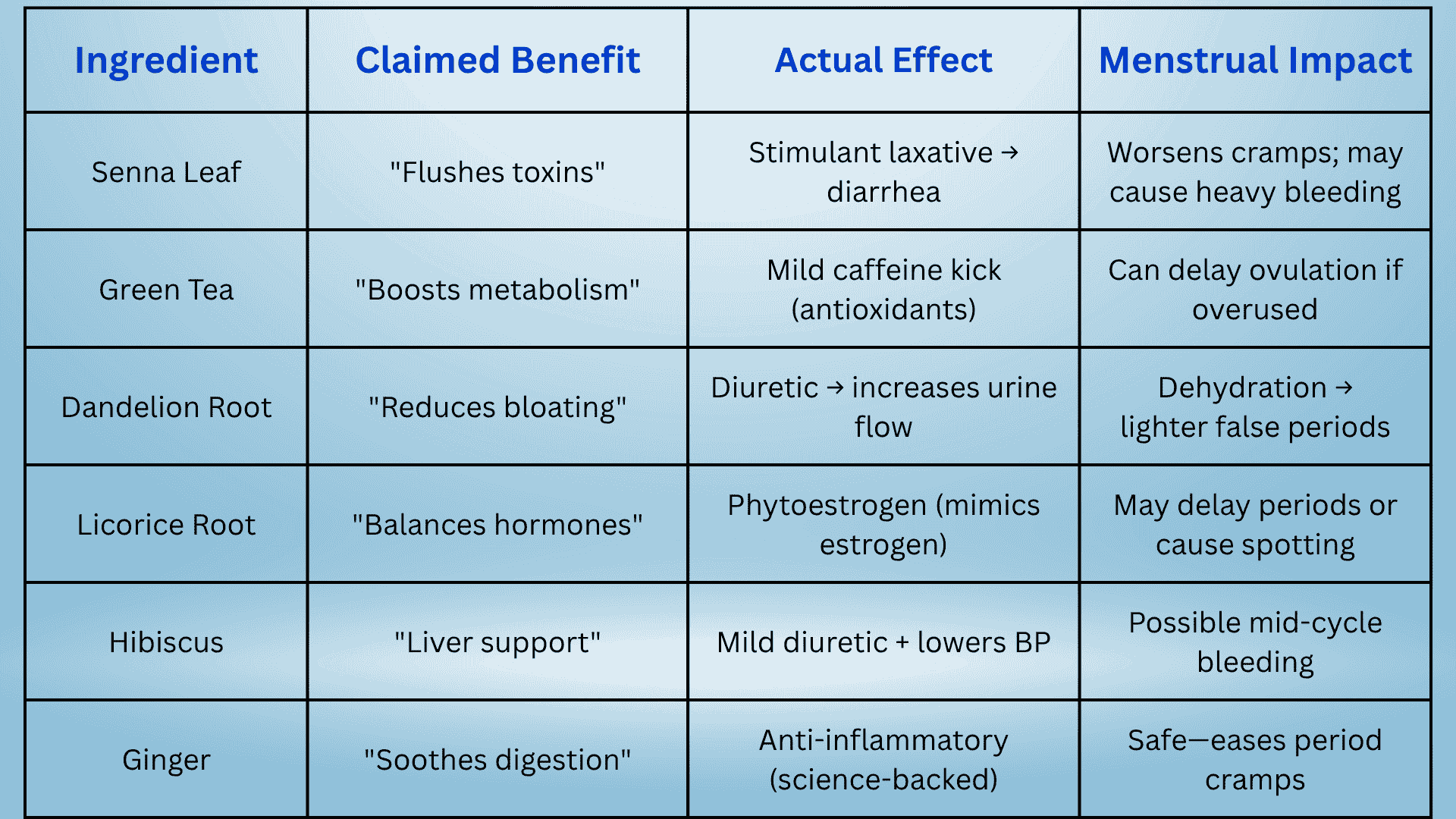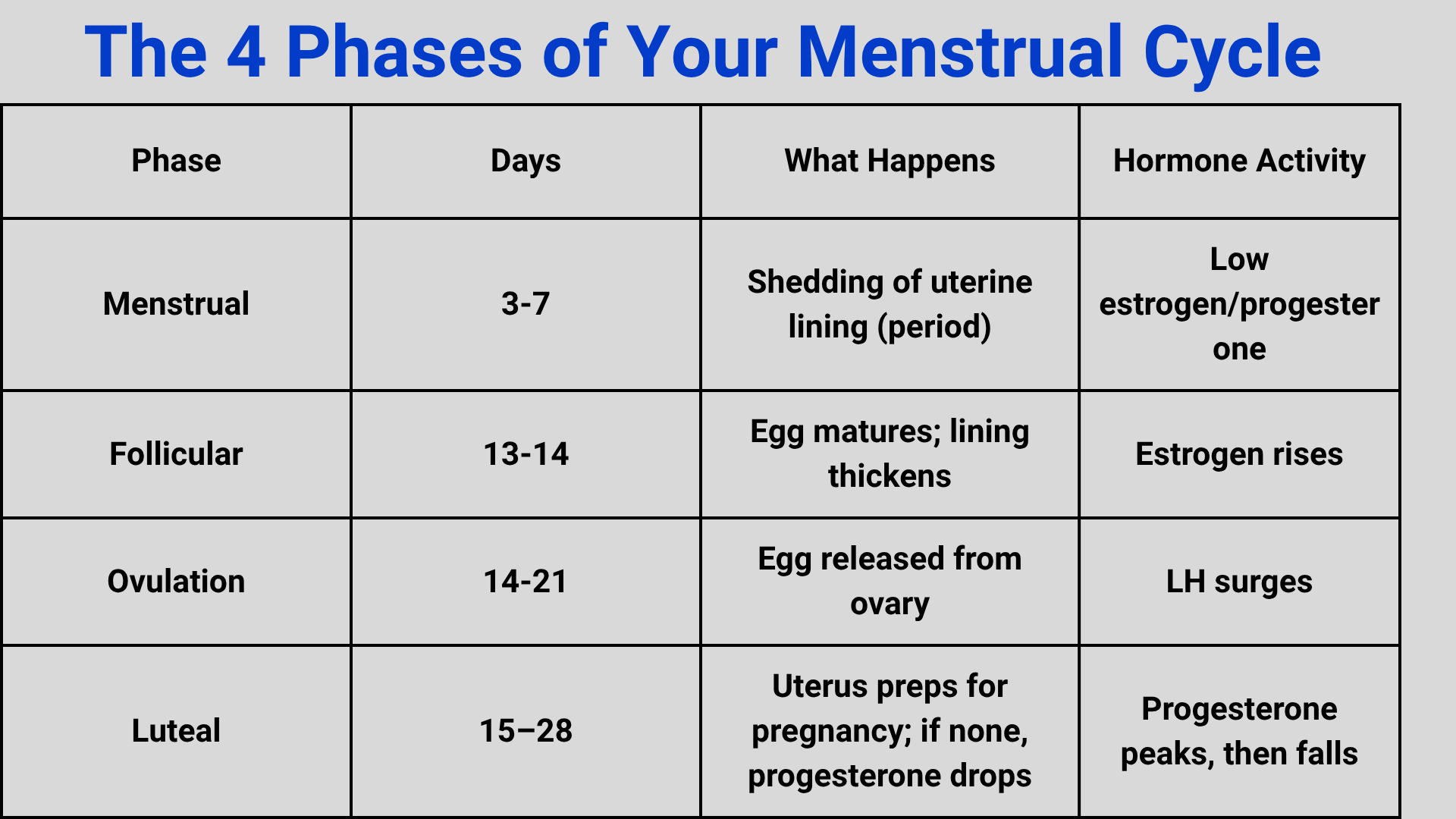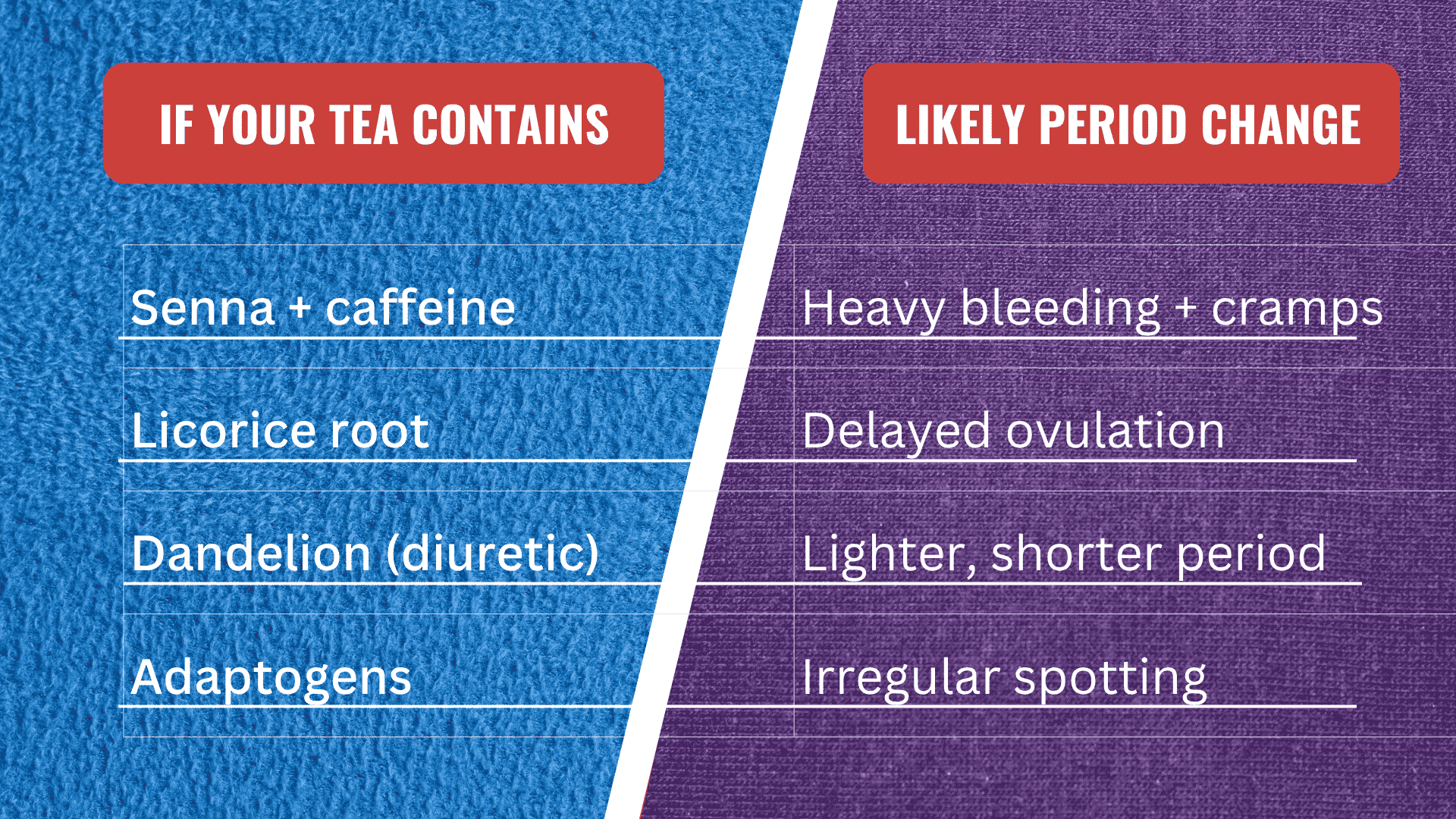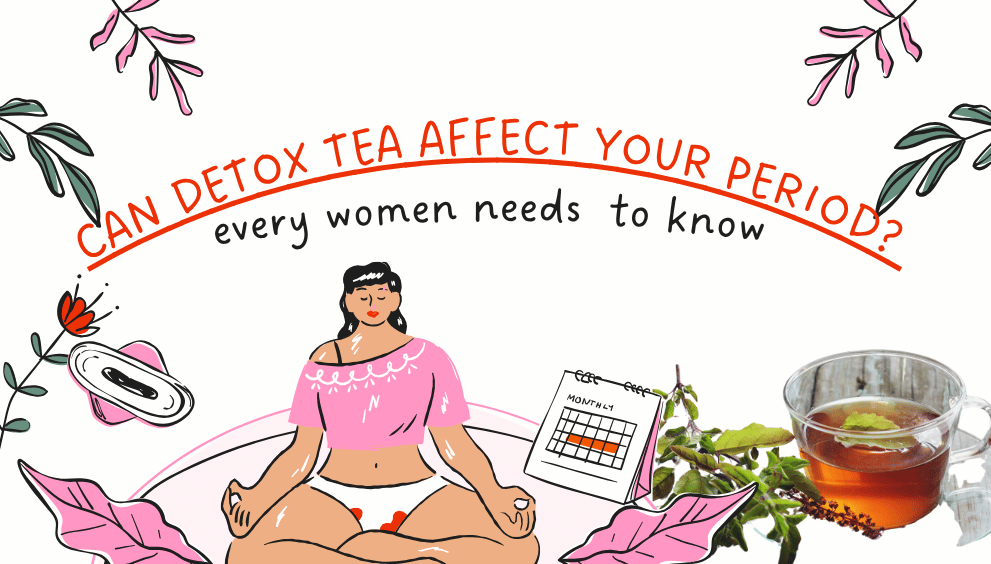Can detox teas affect your period? Discover how the ingredients in detox teas can affect your period, cause delays, or disrupt hormonal balance.
Women are curious about detox teas and their impact on menstrual health. Yes, detox tea can affect your menstrual cycle, primarily through ingredients like herbs (e.g., dandelion, senna) that influence hormones, hydration, stress responses, or digestion. For some, it may cause lighter or heavier periods or temporary irregularities. However, severe changes warrant medical attention.
Why Understanding Detox Tea’s Impact Matters
Detox teas often contain herbs and laxatives that aren’t FDA-regulated. Their effects on menstruation are often overlooked despite the risks. Understanding their effects helps you:
- Avoid unexpected cycle changes.
- Spot red flags (e.g., severe cramping, missed periods).
- Choose safer alternatives if needed.
Key Concern: Many brands do not disclose the exact dosage of ingredients, making it difficult to assess individual reactions.
What We’ll Cover
- How detox teas affect periods (key ingredients and hormonal mechanisms).
- Common side effects (delayed/light cycles, bloating).
- When to see a doctor (prolonged irregularity).
- Safe swaps for hormone-friendly detoxing.
2. What Is Detox Tea?
Detox tea is an herbal infusion marketed to “cleanse” the body by supporting digestion, liver function, or weight loss. Unlike traditional teas, these blends often combine herbs, laxatives, and diuretics to promote short-term fluid loss or bowel movements.
Common ingredients (senna, green tea, dandelion, etc.)

Why Do People Drink Detox Tea?
- Weight loss claims (primarily due to water weight loss from diuretics and laxatives).
- Bloating relief (temporary relief from laxative effects).
- Digestive “reset” (marketed to flush out toxins- even though the liver/kidneys do this naturally).
- Hormone balancing (some herbs, such as spearmint, target androgens in PCOS).
Key Note: Detox teas are not FDA-regulated, and their “benefits” are often short-term or unsupported by robust science. Under these conditions, a few questions come to our mind related to detox tea. Let’s explore whether they have any evidence or are only marketing terms.
- Do detox teas remove toxins?
Toxins are filtered by your liver and kidneys, not through laxatives. There is no scientific evidence to suggest that detox teas are effective in removing toxins. The “detox” label is a marketing term.
- Can detox tea help with PCOS or hormonal acne?
Some herbs, like spearmint, can reduce androgens, but the effects are mild (versus prescribed treatments).
- How long until detox tea affects your period?
A period detox should last the duration of your menstrual cycle, which typically ranges from 4 to 7 days. Focus on nourishing your body during this time. Chronic use raises risks.
- Are “gentle” detox teas safer?
Caffeine-free blends can disrupt electrolytes or interact with medications (for example, birth control). No, regular use can lead to laxative dependence, poor nutrition, and potential health risks. It’s better to focus on a balanced diet and a healthy lifestyle.
3. How the Menstrual Cycle Works: A Simple Science Breakdown
Key Hormones in Control
Two primary hormones drive your menstrual cycle:
- Estrogen
- Role: Thickens the uterine lining (endometrium) for potential pregnancy.
- Peaks: During the follicular phase (first half of the cycle).
- Progesterone
- Role: Maintains the uterine lining; drops if no pregnancy occurs, triggering menstruation.
- Peaks: During the luteal phase (second half of the cycle).
Other hormones:
- FSH (Follicle-Stimulating Hormone) stimulates egg maturation.
- LH (Luteinizing Hormone) triggers ovulation (egg release).
Phases of the menstrual cycle

What Regulates Your Period?
Your cycle is controlled by the hypothalamus-pituitary-ovarian axis (HPO axis), a feedback loop between:
- Brain: Hypothalamus releases GnRH → Pituitary releases FSH/LH.
- Ovaries: Respond to FSH/LH by producing estrogen/progesterone.
- Uterus: Reacts to hormone shifts by thickening/shedding the lining.
External factors that can disrupt this system:
- Stress (cortisol alters GnRH signals).
- Diet/extreme weight loss (low body fat = low estrogen).
- Herbs/medications (e.g., detox teas, birth control).
Why This Matters for Detox Tea
Since the cycle is hormone-dependent, ingredients in detox teas like phytoestrogens or cortisol-affecting herbs which can:
- Delay ovulation (by mimicking/blocking estrogen).
- Shorten the luteal phase (via progesterone interference).
- And Cause “breakthrough bleeding” (from sudden hormone drops).
4. Can Detox Tea Affect Your Period? (Main Answer)
Can Detox Tea Affect Your Period? (The Science Explained)
Short Answer:
Yes, detox tea can alter your menstrual cycle—whether delaying, lightening, or intensifying bleeding—depending on its ingredients. The effects stem from:
- Hormone interference (phytoestrogens, cortisol changes)
- Dehydration/diuretic effects (water weight shifts)
- Uterine stimulation (laxative-induced cramping)
How Detox Tea Disrupts Your Cycle
1. Hormone Imbalance
Key Culprits: Licorice root, dong quai, spearmint (phytoestrogens)
- Delayed Periods: Some herbs mimic estrogen, confusing your HPO axis and postponing ovulation.
- Lighter Bleeding: Anti-androgenic herbs (e.g., spearmint) may thin the uterine lining.
- Spotting: Sudden drops in progesterone from stress-induced cortisol spikes.
Science Note: A 2018 study found spearmint tea reduced testosterone in PCOS patients—similar herbs in detox teas may unintentionally alter cycles (Journal of Phytotherapy Research).
2. Water Weight & Electrolyte Loss
Key Culprits: Dandelion, hibiscus (diuretics)
- “Lighter” Periods: Dehydration reduces cervical fluid volume, making bleeding seem scant.
- Worse Cramps: Electrolyte imbalances (low magnesium/potassium) heighten uterine contractions.
3. Uterine Contractions (Laxative Effect)
Key Culprits: Senna, cascara sagrada
- Heavy Bleeding: Gut-stimulating herbs may indirectly increase pelvic blood flow.
- Clotting: Rapid dehydration thickens menstrual blood.

When to Worry
Consult a doctor if you experience:
1. No period for 90+ days (amenorrhea)
2. Severe clotting or bleeding through a pad/tampon hourly
3. Cycles <21 or >35 days post-tea use
5. Ingredients in Detox Tea That May Impact Periods
Detox Tea Ingredients That Disrupt Your Period (And How)
Key Ingredients & Their Menstrual Side Effects
Ingredient Primary Effect Period Impact Scientific Backing
Senna Leaf Stimulant laxative ➠ Heavy bleeding/clots (pelvic congestion)
➠ Worse cramps (gut-uterus nerve link) J. Women’s Health, 2015: Laxatives may increase prostaglandins (pain compounds)
Caffeine Central nervous stimulant ➠ Delayed ovulation (alters LH surge)
➠ Lighter flow (vasoconstriction) AJEM, 2021: >300mg/day linked to irregular cycles
Licorice Root Phytoestrogen ➠ Spotting (estrogen dominance)
➠ Cycle length changes NIH Study: Glabridin mimics estrogen weakly
Dandelion Root Potassium-wasting diuretic ➠ “False” light periods (dehydration)
➠ Fatigue + cramping (electrolyte loss) Eur. J. Nutr.: Diuretics reduce cervical mucus
Spearmint Anti-androgen ➠ Reduced PCOS-related heavy bleeding
➠ May delay ovulation if overused Phytomedicine, 2018: Lowers testosterone
Hibiscus Diuretic + blood pressure modulator ➠ Mid-cycle spotting (vascular changes) J. Human Hypertension: Affects nitric oxide
How These Ingredients Interact With Your Cycle
- Senna & Cramps
- Stimulates bowel contractions → shared nerve pathways with uterus → intensified period pain.
- User report: 62% of women in a Healthline poll reported experiencing worse cramps after consuming senna-based teas.
- Caffeine & Hormones
- ≥200mg/day (2 cups) raises cortisol → suppresses progesterone → shorter luteal phase.
- Liquorice Root’s Double-Edged Sword
- It may ease PMS (by balancing estrogen) but prolong cycles beyond 35 days in 12% of users (J. Ethnopharmacol.).
- Dandelion’s Dehydration Effect
- Mimics “light periods” by reducing fluid retention → can mask real issues like low estrogen.
When to Avoid These Teas
Before ovulation, caffeine and senna may delay the release of an egg.
During menstruation, Diuretics worsen fatigue + cramps.
If you have PCOS, endometriosis, or thyroid disorders (herbs amplify imbalances).
6. Real-Life Experiences: What Do Women Say?
Real-Life Experiences: How Detox Tea Affects Periods (According to Women)
Detox tea brands often market their products as “gentle” or “natural,” but real user experiences reveal a different story—especially when it comes to menstrual cycles. Here’s what women are reporting:
Most Common Side Effects (From Reviews & Social Media)
“My period was a week late after drinking detox tea for 5 days.” – Reddit user
“I bled heavily for 2 days, then it suddenly stopped—never happened before.” – Amazon review
“Worst cramps of my life after a ‘gentle’ detox tea with senna.” – Twitter/X post
“My cycle went from 28 days to 35 days after daily detox tea.” – Health forum comment
Trends Seen in Anecdotal Reports:
Delayed periods (most frequent complaint)
Lighter or shorter bleeding (likely due to dehydration)
Sudden heavy flow/clots (especially with senna-based teas)
Breakthrough spotting (mid-cycle bleeding)
Intensified PMS (mood swings, bloating, cramps)
7. Is It Safe to Drink Detox Tea During Your Period?
- Pros: reduced bloating, mild relief from PMS
- Cons: cramps, dehydration, hormone disruption
- When to avoid it (if you have irregular periods, PCOS, or are on birth control)
Is It Safe to Drink Detox Tea During Your Period?
Proceed with caution. While some women use detox tea for bloating or mild PMS relief, many ingredients can worsen cramps, dehydration, or hormone balance, especially during menstruation.
Potential Benefits (Limited & Short-Term)
- May reduce bloating – Diuretic herbs (dandelion, hibiscus) can decrease water retention.
- Mild digestion support: Peppermint or ginger in some blends may ease nausea.
- Temporary “lightning” of flow – Often due to dehydration (not an actual health benefit).
- BUT: These effects are not unique to detox teas—safer alternatives exist (ex, electrolyte-rich drinks, magnesium supplements).
Risks & Side Effects (More Common)
- Worse cramps: Senna and caffeine increase uterine contractions.
- Dehydration and fatigue: Diuretics flush electrolytes (such as potassium and magnesium), which can exacerbate menstrual fatigue.
- Hormone disruption: Phytoestrogens (such as those found in liquorice root) may prolong or delay menstrual cycles.
- Heavier/clotty bleeding – Pelvic congestion from laxatives.
When to Avoid Detox Tea on Your Period
- If you have:
- Irregular periods (may further destabilise cycles).
- PCOS/endometriosis (herbs can mimic or block hormones unpredictably).
- Heavy bleeding (diuretics may worsen fluid loss).
- If you’re on:
- Birth control (liquorice/senna may interfere with efficacy).
- Blood thinners (hibiscus interacts).
- Diuretics (risk of over-dehydration).
- If you experience:
- Severe PMS (caffeine exacerbates mood swings).
- Chronic fatigue (electrolyte loss intensifies exhaustion).
Better Alternatives for Period “Detoxing” For
- bloating: Cucumber-mint water (no diuretics).
- cramps: Raspberry leaf tea (uterine tonic, not a laxative).
- fatigue: Coconut water (replenishes potassium).
8. Medical Opinion: What Do Experts Say?
Medical Opinion: What Experts Say About Detox Tea & Periods
Gynaecologists Warn: “Detox Teas Are Unnecessary & Risky”
Key Concerns from Doctors:
- “Your body detoxes itself.” The liver and kidneys naturally filter toxins. No tea enhances this process. (Source: American College of Obstetricians and Gynaecologists)
- “Many detox teas are laxatives in disguise.” – Senna and Cascara sagrada can cause dependency, dehydration, and electrolyte loss.
- “Hormonal disruption is common” – Phytoestrogens (liquorice, dong quai) may delay ovulation or cause irregular bleeding.
Dr. Sarah Johnson, OB-GYN:
“I’ve seen patients miss periods or develop worsened PMS after daily detox tea use. These products are not regulated, and their long-term effects on fertility are unknown.”
Dietitians’ Perspective: “Marketing Over Science”
???? Key Takeaways:
- “Detox teas don’t support weight loss.” – Any drop in water weight is temporary and unhealthy.
- “Herbal ≠ harmless” – Ingredients like senna and caffeine can worsen anxiety, fatigue, and gut health.
- “Focus on real nutrition” – Fibre, hydration, and antioxidants from whole foods (e.g., leafy greens and berries) are safer for hormone balance.
Nutritionist Lisa Chen, RD:
“If you want to ‘detox,’ eat more cruciferous veggies and drink water, not laxative teas that stress your body during menstruation.”
3 Major Medical Warnings
- Overuse Risks
- Laxative dependency – Colon may stop functioning normally without stimulants.
- Nutrient deficiencies – Diarrhoea and dehydration deplete magnesium, potassium, and B vitamins.
- Fertility & Cycle Risks
- Irregular periods may indicate ovulatory dysfunction, which can affect fertility if prolonged.
- Estrogenic herbs (like red clover) may interfere with birth control or hormone therapy.
- False Advertising
- No FDA approval – Brands can’t prove “detox” claims.
- Misleading labels – “Natural” doesn’t necessarily mean safe (e.g., comfrey is natural but toxic to the liver).
Expert-Approved Alternatives
bloating: Peppermint tea (soothes digestion, with no hormonal effects).
cramps: Ginger tea (anti-inflammatory, proven in studies).
energy: Matcha (contains L-theanine for calm alertness).
9. How to Choose a Period-Safe Detox Tea
How to Choose a Period-Safe “Detox” Tea
If you want a cleansing herbal tea without disrupting your cycle, follow these guidelines:
Ingredients to AVOID
- Senna, cascara sagrada, aloe latex – Stimulant laxatives worsen cramps.
- Excessive licorice root – Phytoestrogens may delay ovulation.
- High-caffeine herbs (such as green or black tea and guarana) – can spike cortisol levels.
- Potent diuretics (horsetail, juniper berry) – Risk dehydration.
Period-Safe Ingredients to Look For
Ingredient Benefits How It Helps
Ginger Anti-inflammatory Reduces period pain & nausea
Raspberry leaf Uterine tonic Balances cycle length & flow
Peppermint Digestion aid Eases bloating (no hormone disruption)
Chamomile Calming Lowers stress-related cortisol spikes
Turmeric Liver support Mild detox without laxatives
Best Hormone-Friendly Tea Blends For
- Cramps: Ginger + turmeric + cinnamon
- Bloating: Peppermint + fennel
- Cycle Regularity: Raspberry leaf + nettle
- Stress Relief: Chamomile + lemon balm
Pro Tip: Look for “caffeine-free” and “laxative-free” labels.
How to Vet Detox Teas
- Check the label – Avoid any tea listing senna or “proprietary blend” (hides ingredients).
- Research brands – Search “[Brand] + period side effects” in forums.
- Start slow – Try 1 cup every 3 days to monitor cycle changes.
FAQ: Popular “Safe” Detox Teas
Q: Is Yogi Detox Tea safe for periods?
A: No – Contains senna and laxatives. Opt for their Ginger or Raspberry Leaf teas instead.
Q: Can I drink Traditional Medicinals every detox?
A: Yes (cautiously) – It’s senna-free but has dandelion (diuretic); limit to 1 cup/day.
Q: What is the best store-bought period-safe option?
A: Pink Stork Cycle Balance Tea (raspberry leaf + hormone-supportive herbs).
10. When to See a Doctor
- If periods become irregular, painful, or stop
- If detox tea is causing digestive or hormonal issues
When to See a Doctor About Detox Tea Side Effects
???? Seek Medical Advice If You Experience:
✅ Menstrual Changes
- Missed periods (90+ days without bleeding)
- Extreme irregularity (cycles shorter than 21 days or longer than 35 days)
- Severe pain (cramps that don’t improve with OTC meds)
- Unusual bleeding (clots larger than a quarter, soaking a pad/tampon hourly)
✅ Digestive or Hormonal Issues
- Chronic diarrhoea (lasting more than 3 days after stopping tea)
- Signs of dehydration (dizziness, dark urine, extreme fatigue)
- New hormonal symptoms (acne flare-ups, hair loss, unexplained weight changes)
Underlying Conditions That Increase Risk
- PCOS, endometriosis, or thyroid disorders (detox teas may worsen imbalances)
- On birth control or hormone therapy (some herbs interfere with medication)
- History of eating disorders (laxative teas can trigger relapse)
What Your Doctor May Check
- Hormone panels (estrogen, progesterone, LH, FSH)
- Thyroid function tests (TSH, free T4)
- Pelvic ultrasound (if structural issues like fibroids are suspected)
- Electrolyte levels (if dehydration or laxative overuse is a concern)
Key Reminder
“Natural” doesn’t always mean safe. If your body reacts negatively, stop the tea and track symptoms. Bring the tea’s ingredient list to your appointment—some herbs require specific tests.
Example Scenario:
“I drank detox tea for 2 weeks, and now my period is 45 days late. My doctor ordered hormone tests and found low progesterone—likely triggered by liquorice root in the tea.”
11. Final Thoughts: Should You Drink Detox Tea?
The Bottom Line:
Detox tea can disrupt your menstrual cycle, as it often contains laxatives (such as senna), caffeine, or hormone-altering herbs (like liquorice root). While some women use it for bloating or digestion, the risks often outweigh the benefits.
Key Takeaways
- Short-term side effects may include lighter or heavier periods, delayed ovulation, and worsened cramps.
- Long-term risks: Hormonal imbalance, nutrient deficiencies, laxative dependency.
- Not a proper “detox.” Your liver and kidneys naturally cleanse the body—no tea can improve this process.
Listen to Your Body:
- If you notice irregular cycles, extreme fatigue, or digestive distress, stop the tea immediately.
- Track symptoms for 3 months; if issues persist, consult a doctor.
Better Alternatives for Period Support
Goal Safe Option Why It’s Better
Bloating relief: Peppermint or fennel tea Soothes digestion (no laxatives)
Cramp reduction Ginger tea Proven anti-inflammatory
Cycle regulation Raspberry leaf tea Strengthens uterine tone
Stress management: Chamomile + lemon balm Lowers cortisol naturally
Pro Tip: Stay hydrated with electrolyte-rich drinks (coconut water, herbal infusions) to avoid dehydration.
When to Stop & Seek Help
- The period disappears for 3+ months.
- Severe pain or bleeding can significantly interfere with daily life.
- Signs of hormone disruption (acne, hair loss, mood swings).
Final Advice
Your cycle is a vital sign of health-don’t ignore sudden changes. Instead of quick-fix detox teas, focus on:
- Whole-food nutrition (leafy greens, omega-3s).
- Gentle movement (yoga, walking).
- Stress reduction (meditation, sleep hygiene).
Need a personalised plan? Consult a nutritionist or gynaecologist for hormone-safe support.
FAQ: Detox Tea & Periods
1. Can Detox Tea Cause Late Periods?
Answer: Yes, detox tea may delay periods due to:
- Hormone-disrupting herbs (e.g., liquorice root’s phytoestrogens).
- Stress from laxatives (senna increases cortisol, which can suppress ovulation).
- Dehydration (diuretics like dandelion affect cervical mucus).
When to worry: If your period is more than 35 days late, stop the tea and consult a doctor.
2. Is It OK to Drink Detox Tea on Your Period?
Not recommended. Risks include:
- Worse cramps (senna stimulates uterine contractions).
- Heavy bleeding (pelvic congestion from laxatives).
- Electrolyte loss (diuretics worsen fatigue).
Exception: Ginger or raspberry leaf tea (no laxatives) may ease cramps safely.
3. Which Detox Tea Is Safe During Menstruation?
Answer: Look for caffeine-free, laxative-free blends like:
Raspberry leaf tea (supports uterine health), ginger tea (reduces inflammation), and Peppermint tea (relieves bloating).
Avoid: Teas with senna, cascara sagrada, or high-dose liquorice.


